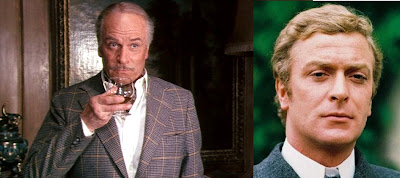I can't say I've ever been a great fan of Michael Caine but I do prefer him when he is young and groovy as he undeniably is in Joseph Mankiewicz's 1972 film Sleuth. In a two-handed all-male cast, he and Lawrence Olivier slug it out for alpha male status.
WARNING: CONTAINS SPOILERS
Follow @MichaelHardach
Despite the somewhat hammy performances from
both men, for my money, Olivier (playing aristocratic Andrew Wyke) blows Caine (Milo
Tindle) off the screen most of the time, which is unfortunate since Sleuth is clearly intended to be some
sort of allegory with Olivier's high-class mansion owner character pitted
against Caine's common immigrant chancer – and Caine's character, Milo,
has his tent firmly pitched on the moral high ground from beginning to end.
Olivier
delights in presenting the slightly camp, delighted-with-himself performance of
a man whose wealth and background have meant he's never had to justify his
actions to anyone. Caine has to put
across a wide range of emotions from bragging cuckold to terrified victim. It's only after finishing the film that I
reflected that Olivier had just as big a range to play, but underplayed the
extremes nicely, unlike Caine who never seems very convincing when he's not
playing a cocksure prick (perhaps he's not acting too hard at those
times). All the big plausibility lapses
come in his performance – notably when he improbably gets lost in the thrill of
dressing up as a clown in the middle of a very adult discussion about robbery
and insurance scams.
Review continues below...
Inspire your baby with the Visual Baby series of picture ebooks. Original patterns and art designed for young eyes. Try them today by clicking the covers below.
"It's the only thing that stops her crying" Katie Alison
"All three of my children love this book" Janice Peterson
"Moons, trees, leaves... fabulous!" Linda Matson
Perhaps the allegory is for empire vs a new
world order, perhaps it is for old-fashioned attitudes vs hip multicultural
city life. Milo makes a pointed comment
that Wyle's novels don't contain many blacks and Milo's Italian heritage is
mentioned numerous times. The sheer contrivance
of the plot and characters begs the viewer to guess at some underlying meaning,
although at one level the contrast between Wyles' detective novels and the
realities of police investigation is a good driver for the plot.
The pitting of two characters against each
other is made all the more dramatically effective when the characters are
opposites, different in background, world-view and class. To have them love rivals on top creates all
the tension you could want. And of course
you need that in a film with just two characters. (Even if we think there are three for a
while.)
I was baffled by one apparent plot hole –
Milo's car is seen hidden in shrubs, which unfairly leads us to believe he has
been murdered. I googled it to see if anyone
had an explanation and found this post.
Despite the OP's attempts to explain it
himself, and the comments of a reader, I was still left with the feeling that
this was a genuine plot hole, although perhaps something was lost in the
edit. Anyone who has seen In Bruges will also recognize that a close-up
blank cartridge shot would cause considerably more damage than we see in this
film.
Overall, I found Sleuth was entertaining but it hit a few too many bum notes.
Personal Score: 5/10
Follow @MichaelHardach
This is part of a series of film reviews where I give my comments on IMDB Top 250 films as a writer. The idea is that over time these posts will build into a wide-ranging writing resource.
For more details about the approach I've taken, including some important points about its strengths and weaknesses (I make no claims about my abilities as a film critic or even the accuracy of my comments... but I do stand by the value of a writer's notes on interesting films), see my introductory post here.




No comments:
Post a Comment